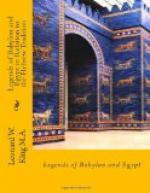(4) Gen. iv. 17 ff. (J).
(5) It may be noted that an account of the origin of divination is included in his description of the descendents of Noah by the writer of the Biblical Antiquities of Philo, a product of the same school as the Fourth Book of Esdras and the Apocalypse of Baruch; see James, The Biblical Antiquities of Philo, p. 86.
I may add that a parallel is provided by the new Sumerian records to the circumstances preceding the birth of the Nephilim at the beginning of the sixth chapter of Genesis.(1) For in them also great prowess or distinction is ascribed to the progeny of human and divine unions. We have already noted that, according to the traditions the records embody, the Sumerians looked back to a time when gods lived upon the earth with men, and we have seen such deities as Tammuz and Lugalbanda figuring as rulers of cities in the dynastic sequence. As in later periods, their names are there preceded by the determinative for divinity. But more significant still is the fact that we read of two Sumerian heroes, also rulers of cities, who were divine on the father’s or mother’s side but not on both. Meskingasher is entered in the list as “son of the Sun-god",(2) and no divine parentage is recorded on the mother’s side. On the other hand, the human father of Gilgamesh is described as the high priest of Kullab, and we know from other sources that his mother was the goddess Ninsun.(3) That this is not a fanciful interpretation is proved by a passage in the Gilgamesh Epic itself,(4) in which its hero is described as two-thirds god and one-third man. We again find ourselves back in the same stratum of tradition with which the Hebrew narratives have made us so familiar.
(1) Gen. vi. 1-4 (J).




